|
|
|
Sort Order |
|
|
|
Items / Page
|
|
|
|
|
|
|
| Srl | Item |
| 1 |
ID:
096760
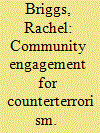

|
|
|
|
|
| Publication |
2010.
|
| Summary/Abstract |
This article explores the development of community engagement within the UK's strategy to tackle international terrorism linked to and inspired by Al-Qaeda, commonly known as CONTEST. It focuses mostly on the 'Prevent' strand of the strategy which seeks to prevent radicalization towards violence, reduce tacit support for violence, and increase the resilience of communities to tackle radicalization and extremist messages themselves. Community engagement for counterterrorism also relates to certain aspects of the 'Pursue' strand of CONTEST, and these are highlighted. The article outlines the case for a community-based approach to counterterrorism and outlines a number of the key developments in its emergence from 2005 onwards. It analyses the performance of this aspect of the counterterrorism strategy, pointing to a number of shortcomings in relation to the establishment of partnerships, the integration of the approach, capacity shortfalls at the local level, and the wider challenges of a hostile political and media environment. Written as the new UK coalition government announces a review of the 'Prevent' strategy, it offers a number of recommendations for the future direction of this area of policy. It calls for an overhaul in working styles, a focus on people rather than projects, and the need to draw a much clearer line between downstream and targeted 'Prevent' work and the broader and longer-term community development work, with the latter encapsulated within the government's Big Society Programme and aimed at all fragile communities, not just Muslims.
|
|
|
|
|
|
|
|
|
|
|
|
|
|
|
|
| 2 |
ID:
096753
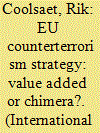

|
|
|
|
|
| Publication |
2010.
|
| Summary/Abstract |
Europe did not wake up to terrorism on 9/11; terrorism is solidly entrenched in Europe's past. The historical characteristics of Europe's counterterrorism approach have been first, to treat terrorism as a crime to be tackled through criminal law, and second, to emphasize the need for understanding the 'root causes' of terrorism in order to be able to prevent terrorist acts. The 9/11 attacks undoubtedly brought the EU into uncharted territory, boosting existing cooperation and furthering political integration-in particular in the field of justice and home affairs, where most of Europe's counterterrorism endeavours are situated-to a degree few would have imagined some years earlier. This development towards European counterterrorism arrangements was undoubtedly event-driven and periods of inertia and confusion alternated with moments of significant organizational breakthroughs. The 2005 London attacks contributed to a major shift of emphasis in European counterterrorism thinking. Instead of an external threat, terrorism now became a home-grown phenomenon. The London bombings firmly anchored deradicalization at the heart of EU counterterrorism endeavours.
|
|
|
|
|
|
|
|
|
|
|
|
|
|
|
|
| 3 |
ID:
096752


|
|
|
|
|
| Publication |
2010.
|
| Summary/Abstract |
Counterterrorism efforts over the past five years have yielded important progress against Al-Qaeda abroad, even with heightened anxiety about the threat of attacks at home. There was certainly no 'clash of civilizations'; violent Salafism engendered a muscular backlash in Muslim-majority countries, which threatened Al-Qaeda's ability to recruit and even survive. At the same time, the policies of major states became more effective and better aligned. A nascent counterterrorism coalition emerged with unprecedented sharing of intelligence, operations and deradicalization techniques (especially bilaterally). In the face of these developments, a defensive Al-Qaeda scrambled to exploit vulnerabilities so as to regain a mental edge. The result was two tactical setbacks for the allies: first, Al-Qaeda and its associates redoubled their efforts to kill civilians on western soil, focusing particularly on radicalized home grown amateurs; and second, they leaned more heavily on reinvigorated affiliates, some of whom tried to project force beyond their local operating areas for the first time. As a result, terrorist operations in the US and UK were more frequent, unpredictable and unsophisticated, but nonetheless potentially lethal. As the period drew to a close, the crucial question was whether the two western allies could maintain their nerve, luck, skill and sufficient equilibrium to both fend off a domestic attack and plan for an effective strategic response in the event that one occurred.
|
|
|
|
|
|
|
|
|
|
|
|
|
|
|
|
| 4 |
ID:
096751
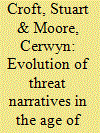

|
|
|
|
|
| Publication |
2010.
|
| Summary/Abstract |
This article examines the evolution of threat narratives in the age of terror, focusing on the United Kingdom. The analysis is broken down into two sections. The first part of the article presents four distinct and yet overlapping notions of the threats which have influenced both the West, and more specifically the UK, in debates about counterterrorism since 9/11. The four threat narratives-Al-Qaeda as a central organization; decentralized terror networks; home grown; and finally apocalyptic threats-have all been used to inform counter terror measures in the West. The second section of the article argues that terrorism has evolved strategically, and is hybridized owing to the security environment-interpenetrated by globalization, digital media and information communication technologies-in which it occurs. The article concludes with a preliminary discussion of some strategic and operational themes which have influenced the form and character of terrorism and insurgency, exploring how they impact on the ways in which threats are constituted and countered, illustrating that what is new maybe the nature of our own fears.
|
|
|
|
|
|
|
|
|
|
|
|
|
|
|
|
| 5 |
ID:
096757


|
|
|
|
|
| Publication |
2010.
|
| Summary/Abstract |
This article adopts the notion of the 'new home front' to consider the spatial complexity of the war on terror and the blurring of domestic and foreign policy divides. It considers the politics and ethics of the war in three main areas: new media and everyday life; liberalism under strain; and citizens' lives, multiculturalism and gender. It discusses the increasing role of horizontal (bottom up) influences alongside vertical (top down) ones, not least in the context of new media, which adds the sociospatial (virtual) realm of online communications to the familiar geospatial (physical) world of politics. Implications of the extended nature of the war on terror are assessed, as well as the potential for developments that have been part of it to impact on the broader sphere of liberal international politics in the future.
|
|
|
|
|
|
|
|
|
|
|
|
|
|
|
|
| 6 |
ID:
096759
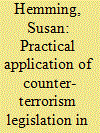

|
|
|
|
|
| Publication |
2010.
|
| Summary/Abstract |
This article gives a prosecutor's perspective on the practical application of UK terrorism legislation. It gives an overview of the working relationship between the Counter Terrorism Division's specialist prosecutors, police officers and the intelligence services, in order to outline some of the challenges in investigating and prosecuting terrorism cases, and to inform on prosecutorial decision-making. It summarizes the main additions and changes to the criminal terrorism legislation over the last decade and gives examples of how some of the key powers and offences have been approached and used by prosecutors. The article deliberately concentrates on the criminal aspects of terrorism legislation and the importance of using due process to prosecute alleged terrorists fairly and proportionately. It describes how prosecutors use a mixture of the ordinary criminal and specialist terrorism laws depending on what is deemed appropriate in any given case. It is not intended to be a critique of the legislation itself or an analysis of what may or may not need to be changed. That is a matter for Parliament; the prosecutor's role is to apply the law not to make it. The article concludes that the criminal justice system is the correct place for terrorism prosecutions to take place and that the UK can continue to retain due process and respect for human rights while seeking properly to protect national security.
|
|
|
|
|
|
|
|
|
|
|
|
|
|
|
|
| 7 |
ID:
096758


|
|
|
|
|
| Publication |
2010.
|
| Summary/Abstract |
The events of September 11 2001 in New York and Washington, and of July 7 2005 in London, have ushered in a new era in protective counterterrorist planning within UK urban areas. With the mode of terrorist attack now encompassing the possibility of no-warning suicide attacks, and target selection now often being seen as related to crowd density, a variety of public places such as sports stadiums, shopping centres, light rail systems, and nightclubs now have to consider 'designed-in' counterterrorism measures. As such the UK has developed a national counterterrorist strategy (CONTEST) which is constantly revised, and one strand of which focuses on protective security measures. In the context of this 'Protect' strand of policy, and the increased targeting of crowded places by international terrorist groups, this article outlines the recent attempts to design-in counterterrorism features to the urban landscape while paying attention not just to their effectiveness and robustness, but also to their acceptability to the general public and impact upon the everyday experience of the city. The article also addresses how the need to consider counterterrorism has affected the practices of built-environment professionals such as spatial planners. Reflections upon how this aspect of counterterrorism policy might develop in the future are also offered.
|
|
|
|
|
|
|
|
|
|
|
|
|
|
|
|
| 8 |
ID:
096756
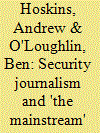

|
|
|
|
|
| Publication |
2010.
|
| Summary/Abstract |
News reporting of terrorism, in the form of security journalism, faces a set of challenges to the functions it serves as a result of both its own practices and the changing practices of news consumers. Security journalism performs some predictable functions, namely the regular delivery of representations of terrorist threats to a presumed national (and international) audience through coverage of Al-Qaeda leaders' speeches, bomb attempts, criminal trials, and 'radical' protests in Britain, among others. Security journalism offers a consistent repackaging of jihadist media productions from one context and language to another. For example, in reducing jihadist texts to short clips of an angry gesticulating man security journalism is prohibiting public understanding of their persuasive potential by cutting any political, religious or sensual appeals. This article presents original data from interviews with British Muslims familiar with jihadist materials that suggest mainstream media reporting may contribute to radicalization in ways not sufficiently appreciated by journalists, policy-makers and the public. Interviewees report that any news depicting Muslim suffering activates and reinforces frustrations and grievances, whether the source is a mainstream media outlet or Al-Qaeda's media wing. Mainstream media may unintentionally contribute to a more enduring but diffused resentment a priori to the existence of jihadist media; as one participant says, 'I am already convinced'.
|
|
|
|
|
|
|
|
|
|
|
|
|
|
|
|
| 9 |
ID:
096754
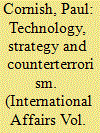

|
|
|
|
|
| Publication |
2010.
|
| Summary/Abstract |
For as long as there has been technology (the application of science and innovation) and for as long as there has been strategy (the use of forces and resources to achieve political goals) there has been a relationship of sorts between these two preoccupations. This article inquires into the nature of the technological-strategic relationship which governments, such as that in the UK, draw upon as they confront international terrorism. To what extent has the historical technostrategic dynamic remained relevant and useful, and where has new thinking been required? The article suggests that a new and more complex understanding of the technology-strategy relationship is emerging in the context of counterterrorism. The challenge facing government is to maintain a technological edge against its terrorist adversary, without exaggerating the adversary's capability, and while ensuring that its counterterrorism strategy pursues a coherent and persuasive political goal.
|
|
|
|
|
|
|
|
|
|
|
|
|
|
|
|
| 10 |
ID:
096755
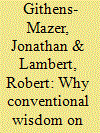

|
|
|
|
|
| Publication |
2010.
|
| Summary/Abstract |
Politicians, the media, and some academics are getting it wrong about radicalization. Relying on simple narratives to explain how an individual departs from point a ('a good Muslim boy') to point b ('a suicide bomber'), too many recent contributions to academia rely on assumptions and 'conventional wisdom' rather than testable and falsifiable empirical research and methods. Through specific cases, this article seeks to demonstrate how the over-simplification of 'conventional wisdom' privileges convenient political narratives over the complex realities of such situations. In light of this failure to account for reality, this article seeks to challenge current thinking on radicalization by exposing its limitations, as currently being used, as a meaningful basis and departure point for rigorous social science research. The article concludes by showing how the current persistence of this 'conventional wisdom' approach to radicalization ultimately betrays the normative political assumptions of those who insist on using this term, and how this adherence to 'conventional wisdom' now deprives radicalization from being a relevant and useful academic or policy discourse. This is because radicalization as an area for study has been corrupted by its instrumental political application.
|
|
|
|
|
|
|
|
|
|
|
|
|
|
|
|
|
|
|
|
|